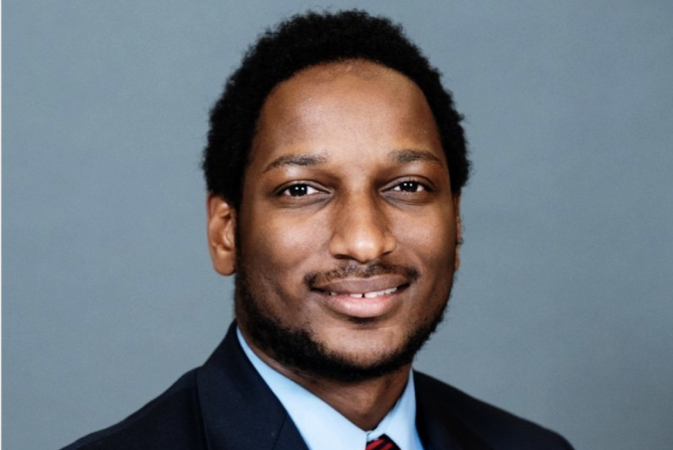Darold “DJ” Kelly Jr.’s life was turned upside down when he was expelled from college for crimes he did not commit. Since reclaiming his innocence, Kelly has been focused on building an association to serve Black cybersecurity professionals.
Born in Washington, D.C., Kelly was raised in Prince George’s County, Maryland. During his tenure at Howard University (HU) where he was studying political science, Kelly was “accused of violence” as he describes it, and he was ultimately expelled from the prominent HBCU in 2016. Kelly was three months shy of graduating from HU when he was forced to halt his educational journey, HBCU Buzz reported.
“My story isn’t necessarily popular, that’s just what it is, and it was during a really bad time to get accused of violence.” Kelly told AfroTech in a video interview. “But I was accused of violent acts I never committed.”
After being convicted, Kelly appealed his case and all of the charges were ultimately vacated in 2019. While he got his innocence back, Kelly lost years of his life and missed out on more than 30 job offers, he said.
“Eventually it did catch up, and it took three years, but the courts acknowledged that they did mess up,” he said.
After this years-long fiasco and despite the turmoil, Kelly decided to reapply to HU and after being re-admitted, he earned a bachelor’s degree in December 2019. While Kelly’s degree at HU was put on hold, he decided to venture into a new career path. Kelly has been studying computer engineering at the University of the District of Columbia (UDC) since 2018. When he was readmitted to HU, he was attending both of the universities full-time for a semester, all while thinking about his next move.
“I started getting interested in coding and I was self-teaching at first during my senior year at Howard,” Kelly said, “but by the time I got expelled and I was forced to transfer, I thought, I might as well change my major.”
When Kelly transferred to UDC, he said all of his credits didn’t transfer over from HU, so he seen this as an opportunity to try something new. Kelly now holds dual bachelor’s degrees in political science and government and computer engineering from UDC.
Despite the rocky road, there was a light at the end of the tunnel when NASA decided to offer Kelly a software engineering internship last summer that spanned from May 2020 to December 2020. This opportunity led to another one, and Kelly is currently working with NASA again as a cybersecurity engineering intern, an opportunity that officially started in January.
“NASA really does a great job at mentoring their interns,” he said.
In the midst of all of the hard work Kelly has been doing to better his life, he’s working even harder to better the lives of other Black individuals looking to embark on careers in cybersecurity and technology. On July 9, 2020, Kelly launched the Black Cybersecurity Association (BCA), which is a nonprofit that provides career mentorship and workshops to underrepresented minorities looking to break into the cybersecurity industry.

“Black people need more pathways into cybersecurity and we are very much so interested in forging a pipeline not only for people to break into the field, but also doing things like offsetting wage gaps and cracking the glass ceilings to leadership,” Kelly said.
BCA provides various offerings including cybersecurity training courses, resume workshops, home networking lab sessions, and most notably, its Kids Can Code program where the organization teaches young Black students about coding and other topics as they prepare to enroll in STEM opportunities. The association also hosts the BCA Coffee Shop, where members can go for job training and networking opportunities. Kelly said BCA hosts at least five different programs a week and the association has roughly 2,000 members ranging from grade school kids to college students and professionals seeking to better their tech skills.
“It hurt my heart when I had to leave the classroom,” Kelly said as he moved into the president and CEO roles at BCA as the organization began to grow.
When thinking about launching BCA during the pandemic, Kelly said a few of his plans had to change but for the most part, he and is team were able to bring the association to fruition as best as possible. The association couldn’t have come at a better time, he said, since so many professionals were changing their careers and looking for tech upskilling opportunities last year. All of BCA’s work is centered on preparing Black people for tech certifications so they can land better jobs in the cybersecurity field.
The association has coaches and instructors who have been teaching virtually since BCA’s launch. The BCA staff works on a volunteer basis but after winning first place and $500,000 from a grant competition hosted by the Gula Tech Foundation, Kelly said he is most looking forward to getting his staff paid. Some of the funds will also be used to improve BCA’s programs, formalize a lot of the association’s internal processes and eventually provide scholarship opportunities to members.
“We really want to increase our ability to function correctly,” Kelly said. “Everybody for the past nine months has been working for free so I’m ready to compensate them and say thank you, not just verbally but financially.”
In the next year, Kelly is looking to get more members signed up with BCA and getting some job offers secured for them. He also wants to see more Black students step up and become STEM majors in college.
“Our goal over the next 10 years is to increase the cybersecurity workforce with the addition of 10,000 beautiful Black faces,” he said. “I would really love to see by this time next year, we work on that goal by adding at least 1,000.”
If you’re interested in becoming a BCA member, check out this application.


